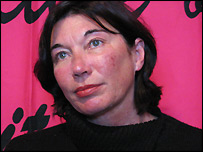|
By Cindi John
BBC News community affairs reporter
|


Catherine Healy says there is some resistance to the law change
|
At a conference in London on Saturday, women involved in the sex trade will call for the decriminalisation of their industry. One woman with first-hand experience of such a campaign is Catherine Healy, of the New Zealand Prostitutes' Collective.
Catherine Healey still sounds amazed when she talks about the decriminalisation in 2003 of prostitution in New Zealand.
"We were very determined but didn't think we'd actually achieve getting the law changed. It was a long battle over 15 years to get those draconian measures off our statutes books."
Ms Healey believes the success of the NZPC's campaign hinged on changing public attitudes.
"Things would happen, the police would do raids and the media would be interested so they'd ring and ask us for comment.
"So certainly public opinion built that taxpayers' money was being squandered on rounding up sex workers and pushing them though the courts," she says.
 |
 It wasn't against the law to ask or pay for sex but it was against the law to ask for money for sex
It wasn't against the law to ask or pay for sex but it was against the law to ask for money for sex

|
The NZPC had been campaigning for the law change since 1987.
Before that, says Ms Healey, many of New Zealand's 8,000 sex workers, including herself, had been forced to hide behind the "facade of massage parlours".
"I started working on the streets in 1972 when I was a student and then I went into brothel work and massage parlours in the 80s. Everyone had to deny the real nature of what they were doing.
"The client of course was totally supported by the law - it wasn't against the law to ask or pay for sex but it was against the law to ask for money for sex which of course was the activity the sex workers couldn't avoid, " she says.
Referendum call
Ms Healey, a former primary school teacher, says she and her NZPC colleagues started the campaign for decriminalisation out of a sense of injustice.
"I was charged with soliciting but contested it because a conviction sticks with you and inhibits your movement in and out of the sex industry. It certainly shut the door on teaching for me, not that I minded."
Now they are no longer members of an illegal industry, sex workers have a lot more personal security and bargaining power, Ms Healey says.
"Since the change in the law, people feel they can approach the police and report violence. And it has changed the dynamics between sex workers and clients."
Though prostitution and activities surrounding it are legal, Ms Healey says the NZPC knows they still have a struggle on their hands.
"There is a pocket of resistance and there always will be people who find it very difficult to accept that sex work exists.
"There are certainly people who are outraged and trying to get a referendum to overturn the vote to decriminalise the sex industry," she says.
